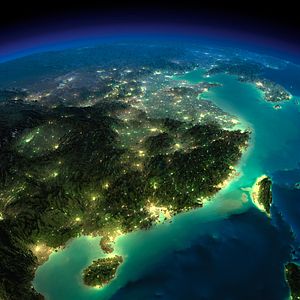A spokesman from Taiwan’s Mainland Affairs Council (MAC) confirmed on Thursday that Taiwan will not cooperate with China to handle territorial disputes in the South China Sea. Earlier, spokesman Ma Xiaoguang of China’s Taiwan Affairs Office (TAO) had said that the PRC had proposed cross-strait cooperation on territorial disputes in the South China Sea.
Beijing’s extensive claims to the South China were originally drawn up by the Republic of China government, which moved to Taiwan in 1949. Officially, Taiwan’s territorial claims are the same as the mainland’s. Accordingly, the PRC has suggested that both sides of the Taiwan Strait should cooperate to push forward their claims. “Safeguarding the country’s sovereignty and territorial integrity as well as the overall interests of the Chinese nation should be a common obligation of compatriots of the two sides,” Xinhua quoted TAO spokesman Ma Xiaoguang as saying.
The response from Taiwan rejected that idea. Both MAC spokeswoman Wu Mei-hung and Foreign Minister David Lin said that Taiwan would not cooperate with the PRC on territorial issues. Wu said Taiwan saw no possibility of cooperating with China on the South China Sea, and emphasized that this has long been Taiwan’s official government stance.
Taiwan’s preferred method for handling the disputes, according to Wu, would be similar to President Ma Ying-jeou’s East China Sea Peace Initiative. Under this plan, all claimants to the disputed Senkaku/Diaoyu Islands (Taiwan, China, and Japan) would agree to work together on joint exploration and development while each reserving their separate territorial claims. Using this framework as a guide, in 2013 Taiwan and Japan signed a landmark fishing agreement that would allow Taiwanese vessels to access the disputed (but Japanese administered) waters around the Senkaku/Diaoyu Islands.
It seems Taiwan would be interested in similar agreements for the South China Sea. However, given that many of the disputed areas are contested by multiple claimants, such agreements would be much harder to negotiate.
Taiwan had been largely on the sidelines in terms of the recent spat between China and Vietnam, until the recent riots outside of Ho Chi Minh City attacked hundred of Taiwanese factories. There are conflicting media reports on the number of casualties — Taiwan’s CNA reported two Chinese nationals dead and 2 Taiwanese injured. Reuters, citing a doctor and company officials from the affected area, reported that up to 21 people had died in the violence, including five Vietnamese workers and 16 people identified as Chinese (a number that may include Taiwanese citizens).
In response to the violence, Taiwanese officials have held a number of meetings with the Vietnamese government urging increased protection for Taiwanese living in Vietnam. Foreign Minister David Lin has also asked Vietnam to “act responsibly” by compensating affected businesses “once the situation has calmed down.”
While the immediate focus is on the security of Taiwanese people and property, in the medium- to long-term, this incident may encourage Taiwan to more vocally differentiate its South China Sea policies from China’s. According to CNA, Taiwan’s representative to Vietnam, Huang Chih-peng, complained that Vietnamese police “should have told the protesters the difference between Taiwan and China.” As regular Diplomat contributor J. Michael Cole writes for Thinking Taiwan, many people outside of Taiwan and China simply do not understand the difference between the two, and thus anger at China also affect Taiwan. “It is therefore in Taipei’s interest to pressure Beijing to act responsibly and agree to compromise with its neighbors,” Cole writes.
Strategically, Taiwan simply doesn’t have much say over how Beijing pursues its territorial claims. However, Taiwan can control how it handles its own claims — and being the recipient of anti-Chinese anger may encourage Taipei to be more clear in differentiating its approach from Beijing’s. Cooperating with Beijing against other claimants, as the PRC government suggested, would only increase hostility toward Taiwan in other Southeast Asian countries.
While Taiwan and the mainland’s claims are largely the same, Taiwan could show itself willing to pursue resource-sharing agreements like the one signed with Japan. Taipei could also differentiate itself from Beijing by being open to international arbitration and by defining the extent of its claims more clearly, with an eye towards international law. As one possible avenue for doing this, Joseph Wu, Executive Director of Policy for the opposition Democratic Progressive Party, told The Diplomat that the DPP is exploring basing Taiwan’s claims in the South China Sea off of its control of Taiping Island, the largest of the Spratlys. Under this legal argument, Taiwan’s claims would correspond to the Exclusive Economic Zone (EEZ) generated by Taiping Island according to the UN Convention on the Law of the Sea, rather than being based on harder-to-define historical claims.

































